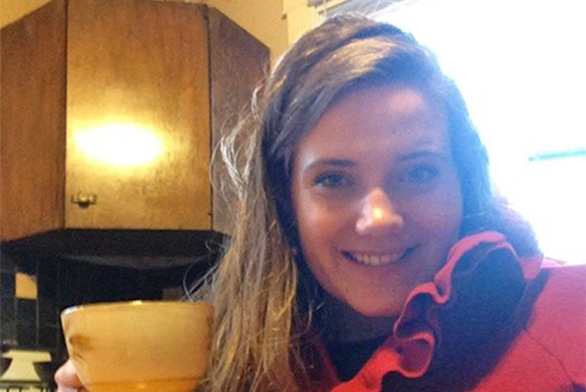From Maxwell to Space-Engineering: Erin Wiles (SF10) on Learning to Be a Learner
October 5, 2022 | By Aayush Thapa (SF22)

It is sometimes easy for Johnnies to imagine themselves as tech-averse neo-Luddites, obsessed only with reading books that must have been scribed on papyrus leaves for centuries before they ever saw the inside of a printing press. But this reputation is as undeserved as it is self-limiting. St. John’s produces graduates who are not only making headway in fields of technology and engineering but are actively encouraged by their education to take up those challenging professions.
Erin Wiles (SF10) is one such alum. She has recently started working as an electro-magnetic compatibility (EMC) engineer for Blue Origin, a spacecraft company that is reimagining the world of spaceflight by adding new potential for commercial and human travel. Wiles, who trained as an electrical engineer at Montana Tech University, finds that her current job is something of a departure from her educational and professional background; her previous work includes a position as an electrical engineer at Raytheon and some part-time consultancy for Microsoft.
“EMC is about conducting a lot of analysis,” she says. “[I am] making sure that the various electronics in a craft are not needlessly interfering. What happens when you put an intricate electromagnetic component in space or in extremely cool temperatures? I define recommendations based on all these factors.” Wiles is constantly learning on the job, whether that means delving into the specifics of a given spacecraft or the complex literature on the minutiae of spacecraft engineering and the vast body of science supporting it. Her work requires careful analysis and a drive to learn about complex subjects quickly, and Wiles is adept at both. She credits these abilities, in part, to her time at St. John’s.
Wiles’s favorite tutorial was junior lab, and she says her deep interest in electronics and electromagnetism began while she was poring over Faraday’s journals and working through the Maxwell equations. She also enjoyed her sophomore math tutorial, where she and her classmates took pains sweating the smallest details of Apollonius’s analytic geometry. Wiles suggests, however, that the content of these classes is only part of the skillset that supports her in her current profession.
“Ultimately, St. John’s instills a deep-seated curiosity in people, and it makes you believe that you can learn anything, even on your own,” says Wiles, who traces this curiosity paired with boldness back to the beginning of her career. She characterizes the pursuit of her technical degree as a series of scary decisions and commitments, requiring a lot of hard work. Yet she felt constantly bolstered by her time at St. John’s, where she was a quick and fearless learner. It is this same love of learning that led her to participate in multiple Ariel internships in different science labs where she was able to put those transferable skills into practice.
St. John’s has given Wiles the confidence to do her job and continue learning while she’s in it. What is more, she immensely enjoys learning on the job—as well as sharing the new things that she learns. For her, the most fulfilling part of her job is delving into new and exciting research and explaining it to people “who are very smart but don’t necessarily have the expertise in these fields.”
She describes this continual desire to learn and articulate difficult concepts as important skills that endear one to coworkers and employers. Of course, this is assuming that the work environment itself supports an exchange of ideas and knowledge. “That’s why,” says Wiles, “it’s so important to seek out environments that promote collaboration and growth, as opposed to unhealthy competition.”
Wiles’s intellectual curiosity is not constrained to the workplace. She wrote her senior essay on John Milton and says that St. John’s never limited her to one branch of knowledge or one kind of learning. This is an inheritance that she does not plan on giving up any time soon. “St. John’s makes you think and question what it means to be a complete human being, not just a worker,” she says.
She continues to nurture her love of poetry and says that a lot of her coworkers enjoy it, too. For Wiles, the love of learning, once instilled, is all-encompassing. It carries its end in itself and takes over a life, enriching the soil in which it develops roots.

